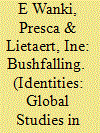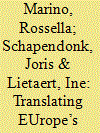|
|
|
Sort Order |
|
|
|
Items / Page
|
|
|
|
|
|
|
| Srl | Item |
| 1 |
ID:
169048


|
|
|
|
|
| Summary/Abstract |
Educational mobility in Cameroon is not a recent phenomenon, yet through the notion of ‘bushfalling’ – that is, the way international migration is envisioned and constructed in Cameroon – young Cameroonians explore routes to new destination countries for educational migration as a way of fulfilling their dreams of a better future. These dreams are enabled and challenged by the different role identities the students have to combine in the destination country. This article focuses on self-sponsored Anglophone Cameroonian students in Flanders, who combine roles as students, workers and transnational caregivers. Using bushfalling as our analytical lens, we explore the change in understanding bushfalling through the educational route and its implications for transnational family relations. Further, we explore the various ways in which these students negotiate and manipulate the different roles, yet keep the student role identity in the centre, and how this in turn informs their next step in the education-migration trajectory.
|
|
|
|
|
|
|
|
|
|
|
|
|
|
|
|
| 2 |
ID:
191439


|
|
|
|
|
| Summary/Abstract |
The end of a long-standing autocratic regime in The Gambia renewed EUrope’s geopolitical interest in the externalisation of (return) migration management to the West African country. Since 2017, EUrope has financed several programmes implemented by a combination of international and local actors. Analysing original qualitative data through the lens of the sociology of translation (SoT) offered by actor-network theory (ANT), this paper explores the incorporation of locally owned civil society organisations (CSOs) within the socio-material network of externalisation. As such, it engages with the understudied perspective of Southern implementers in the context of migration management. In our analysis, we put central two notions of SoT: interessement and enrolment. With the first, we show how the development and migrant-protection interests of locally owned CSOs are brought in alignment with the EUropean objective of curtailing irregular migration. This process of interessement is never complete, but leaves room for excess positions, which here correspond to the locally owned CSOs’ criticism of EUrope’s appropriation of Gambian natural resources, practical organisation of migration management and excessive immobilisation of Gambians. The notion of enrolment refers to the processes of negotiation addressing part of these excess positions. Even with enrolment being successful, locally owned CSOs keep imagining, and to some extent, performing alternative ways of dealing with migration. Such alternative thinking and practicing will overtake the EUropean only if multiple and stable connections arise around it. Our ANT-driven analysis demonstrates that local implementers endorse EUropean migration management because they broadly see it as beneficial; yet, with their criticism, requests and imagination, manage to limitedly alter it, and may, potentially, transform it.
|
|
|
|
|
|
|
|
|
|
|
|
|
|
|
|
|
|
|
|
|